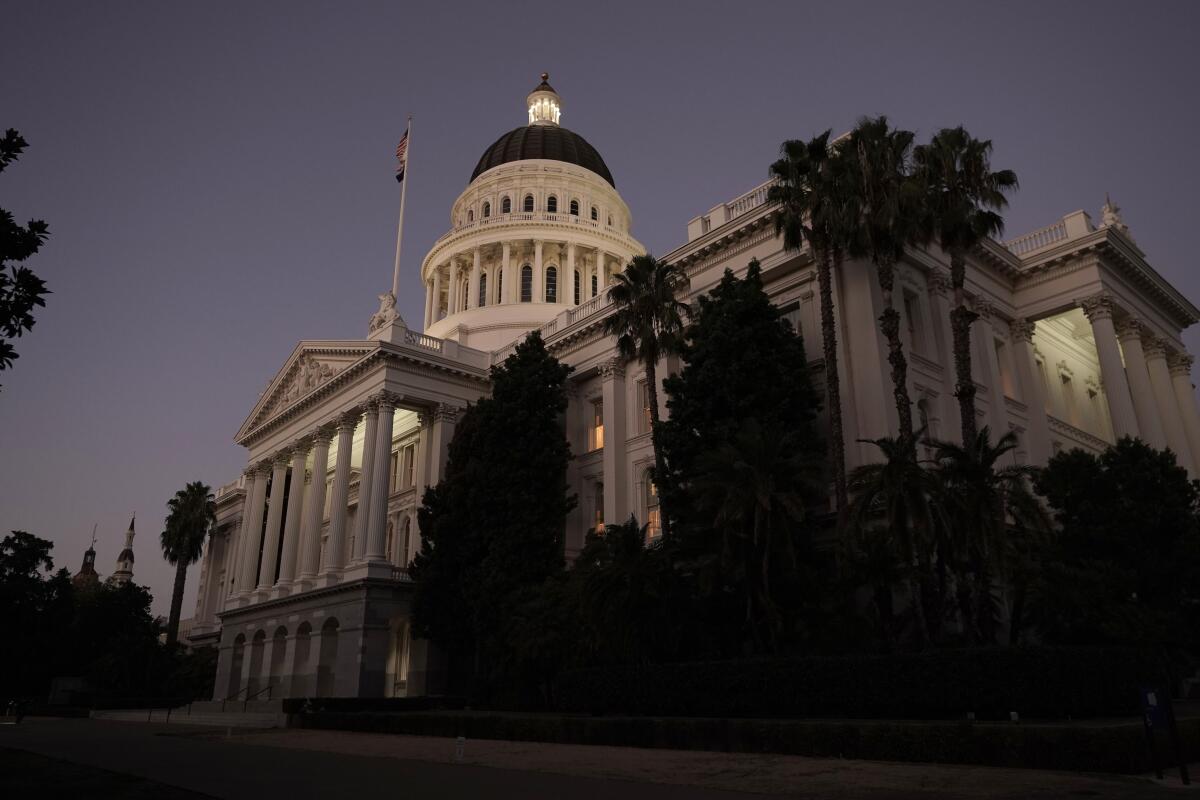Here are some of the 300 bills California Democrats killed amid $31.5-billion deficit

- Share via
SACRAMENTO — Democratic leaders at the California Capitol killed nearly 300 bills on Thursday during the ritual fast-paced culling of legislation in the mysterious “suspense file.”
Officially, the suspense file is a tool for legislative leaders to evaluate costly bills by weighing them against one another and deciding what to advance to a vote by the Senate and Assembly. Unofficially, it’s used as a way for Democrats who control the Legislature to snuff out controversial bills with few fingerprints.
Sometimes the underlying cost is to blame. Other times, bills die in the suspense file because Democratic leaders want to shield rank-and-file members from publicly taking a stance. Often, bills die in the suspense file with no explanation.
Bills that quietly failed include proposals that would have benefited low-income children, further curbed gun ownership and helped some renters afford a rising cost of living.
Why is this happening?
California lawmakers typically introduce about 2,000 bills a year, so the suspense file is a way to thin the heap. The Senate puts bills in the suspense file if they would cost the state at least $50,000 and the Assembly puts them there if they cost at least $150,000. Then, twice a year, the appropriations committees decide which ones will live to see another day.
“The role of the appropriations committee is to take the bills, and consider the cost and consider the benefits, and weigh that with our overall fiscal health,” said Lorena Gonzalez Fletcher, who led the Assembly Appropriations Committee from 2016 to 2021.
But there is a political component too: Killing a bill by leaving it in the suspense file means most lawmakers do not have to vote on it, shielding them from making a difficult decision.
What’s different this year?
After several flush budget years, California is facing a deficit that Gov. Gavin Newsom has estimated at $31.5 billion. With money running tight, lawmakers face pressure to shelve bills with hefty price tags.
“It is a different time that we have to operate in,” Chris Holden (D-Pasadena), chair of the Assembly Committee on Appropriations, said of the budget deficit after Thursday’s hearing.
One bill that died would have cost between $10 million and $15 million a year to allow more people who are wrongfully convicted of crimes to seek compensation from the state after they’re exonerated. Another bill would have prohibited the state from collecting interest on child support that is in arrears at a cost of at least $18 million, depending on how much is collected from parents.
Did anti-poverty programs take a hit?
Yes. Though Democratic leaders protected much of the state’s social safety net, they scrapped proposals to expand tax credits for low-income Californians.
That includes bills that would have given extra cash to renters and families with children.
The California Young Child Tax Credit allows eligible families with children younger than 6 to get up to $1,000. AB 1128, by Assemblymember Miguel Santiago (D-Los Angeles), would have removed that age cap, allowing more than 1 million eligible children of any age to benefit.
Santiago said in a statement that he will push for $700 million in the state budget to make it happen because families across California deserve relief against inflation so they can afford necessities such as food and rent.
Other anti-poverty measures that failed include a bill that would have increased the minimum payments to families under the California Earned Income Tax Credit and a Republican bill to increase tax credits meant for renters — legislation that has repeatedly failed in the past despite a subsidy that has been stagnant for decades.
Disappointed advocates had urged the state to fill in the gaps left by federal programs that were launched in the pandemic and have since expired.
“Of course we are all aware of the budget forecast. Still, these dollars are investments not just in families but also in communities and local economies,” said Teri Olle, California campaign director for the Economic Security Action Project.
What about gun control?
After a mass shooting in Monterey Park in January that killed 11 people, lawmakers responded with a wave of new gun control legislation.
Most of those bills advanced, minus two proposals by Assemblymember Jesse Gabriel (D-Encino), who leads the Legislature’s Gun Violence Prevention Working Group.
The first would have allowed people suffering from mental health crises who are at risk of suicide to voluntarily add their name to a “do not sell” list.” The other would have prohibited someone with a domestic violence protective order filed against them from buying or owning guns for an additional three years after the order expires.
“I was a little bit caught off-guard,” Gabriel said, adding that the two bills were “important parts of the overall puzzle” of solving gun violence because they aimed to address the effects of suicide and domestic violence on firearm deaths.
A pause on police reform
In 2020, Assemblymember Kevin McCarty (D-Sacramento) scored a win for the movement to curb police shootings when he passed a law that requires the state Department of Justice to investigate deadly shootings of unarmed civilians.
McCarty tried to expand that law this year to include all fatal police incidents, including those that result in the death of someone who’s armed and instances when officers used deadly force other than a firearm, such as excessive tasing or a chokehold.
But the state agency has lagged in moving through its caseload. Since the law went into effect in 2021, investigators have closed only two cases, with dozens more in the queue.
The Department of Justice estimated the additional investigations proposed in McCarty’s bill would cost “hundreds of millions of dollars” and require an additional 632 workers.
McCarty said the bill would have plugged a “glaring hole” in the effort to investigate deadly incidents.
“It’s still something that I’m committed to,” McCarty said. “I think eventually we need to have all officer-involved shootings investigated independently outside of the local jurisdiction, preferably by the attorney general.”
A win for fossil fuels
Oil and gas companies scored a win when the Senate Appropriations Committee killed a bill that would have held them liable for health problems experienced by people who live close to wells and drilling projects.
Environmentalists backed the measure, but a fiscal analysis estimated that it could cost hundreds of millions of dollars to decommission oil and gas wells.
“Today, we missed a key opportunity to advance legislation that would hold polluters accountable and prevent further harm to families who are just trying to stay healthy and have a better quality of life,” state Sen. Lena Gonzalez (D-Long Beach) said in a statement.
More to Read
Sign up for Essential California
The most important California stories and recommendations in your inbox every morning.
You may occasionally receive promotional content from the Los Angeles Times.













